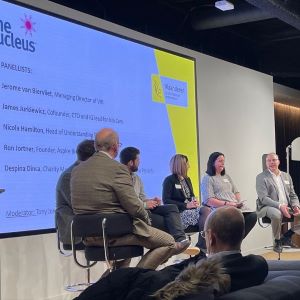 The end of 2023 saw us going to a series of networking events and it was through this that we received an invitation at one of the Fringe events of Genesis 2023 Conference. This was a panel discussion on 'Accessing Patient Data' organised by Flanders Investment & Trade - UK and One Nucleus.
The end of 2023 saw us going to a series of networking events and it was through this that we received an invitation at one of the Fringe events of Genesis 2023 Conference. This was a panel discussion on 'Accessing Patient Data' organised by Flanders Investment & Trade - UK and One Nucleus.
The panel was a mix of representatives of data companies, life sciences experts and we were honoured to bring the patient view into the conversation. Despina Dinca (second from the right in the photo), our Charity Manager, was invited to be part of the discussions about patient healthcare data, the access to it and how we could unlock the power of this data to build a successful, innovative healthcare system rising up to the challenge of looking after everyone, whether rare or common conditions.
The panel along with the audience of about 60, were interested to hear about patients’ views on sharing their healthcare data for the greater good. It emerged that nowadays there is far more awareness among the patients that by sharing their data they enable science and research to progress faster. However, there is still concern about how this data is used and stored. Therefore, being sure to communicate clearly to the patients is utterly important for everyone involved. Here is where advocacy organisations like us can facilitate these communications, by deciphering the ‘small print’ of the data handling companies and making them accessible and clear to the patients. Building trust and correct understanding in the data-sharing process takes time, but it will benefit both scientific and patient communities in the long run.
The access to patient data is seen as a vital step in improving the research and development (R&D) processes. The ultimate aim is to accelerate the pathways to new drug development and making it possible to get the right drug to the patient in need of it, at the right time. Inevitably this brings to the table the commercial element of the pharmaceutical industry. Is this industry a friend or a foe in the eyes of the patient? A bit of both seemed to be the most common answer in the panel. The solution is rather somewhere in the middle, by forming an alliance between the two, where both parties can mutually support each other. The patients should remain the curators of their own shared data and should be involved in the R&D process as early as possible.
This is another place in the rare diseases environment where the patient advocacy organisations like us can help with managing a patient registry or help building one, where it doesn’t exist already. We are the existing link between patients and the R&D world, we can contribute significantly to make this work and therefore help all communities involved.
We are here to listen and understand what’s needed, what we could make possible and how we can do more! We welcome your views if you wish to share them with us.